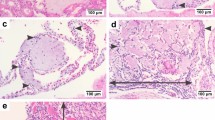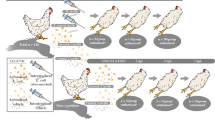Abstract
IN our laboratory the transmission rate of the lactic dehydrogenase (LDH) agent from infected to uninfected adult CAF–1 male mice housed together for more than a month was very low1,2. Other laboratories, however, have reported high3 or variable4 rates of transmission. The work recorded here was undertaken to investigate the factors which might be responsible for these differences.
This is a preview of subscription content, access via your institution
Access options
Subscribe to this journal
Receive 51 print issues and online access
$199.00 per year
only $3.90 per issue
Buy this article
- Purchase on Springer Link
- Instant access to full article PDF
Prices may be subject to local taxes which are calculated during checkout
Similar content being viewed by others
References
Notkins, A. L., and Scheele, C., J. Exp. Med., 118, 7 (1963).
Notkins, A. L., Proc. Amer. Assoc. Cancer Res., 4, 48 (1963).
Hill, B. R., Tanaka, K., and Roberts, E., Proc. Amer. Assoc. Cancer Res., 3, 328 (1962).
Plagemann, P. G. W., Gregory, K. F., Swim, H. E., and Chan, K. K. W., Canad. J. Microbiol., 9, 75 (1963).
Notkins, A. L., and Shochat, S. J., J. Exp. Med., 117, 735 (1963).
Author information
Authors and Affiliations
Rights and permissions
About this article
Cite this article
NOTKINS, A., SCHEELE, C. & SCHERP, H. Transmission of the Lactic Dehydrogenase Agent in Normal and Partially Edentulous Mice. Nature 202, 418–419 (1964). https://doi.org/10.1038/202418a0
Issue Date:
DOI: https://doi.org/10.1038/202418a0
Comments
By submitting a comment you agree to abide by our Terms and Community Guidelines. If you find something abusive or that does not comply with our terms or guidelines please flag it as inappropriate.



